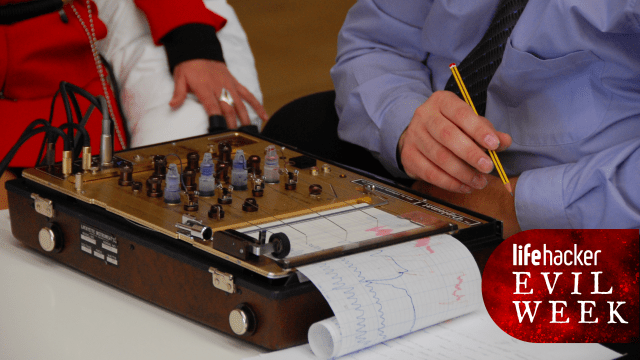Polygraph machines, better known as lie detectors, are crap. They can’t tell whether you’re lying, just whether your body is doing some of the things that bodies do when we’re nervous: Sweating, for example. But there are a few tricks that, according to rumour, can let you mess with the results.
Photo by Gabriel Rodríguez.
It’s Evil Week at Lifehacker, which means we’re looking into less-than-seemly methods for getting things done. We like to think we’re shedding light on these tactics as a way to help you do the opposite, but if you are, in fact, evil, you might find this week unironically helpful. That’s up to you.
Lie detector test results aren’t admissible in US and Australian courts, but it’s usually totally legal for an officer to use the lie detector as sort of a conversation starter to prod you to confess. In the US you could also be hooked up to a lie detector as part of a job interview or a background check, or by an employer’s request, however this does not occur in Australia.
Today we’re taking some tips from The Lie Behind the Lie Detector, a 2005 ebook that claims to have all the secrets about how lie detectors work, how you can beat them, and how the lie detector people will try to outsmart you. We haven’t tested these tips with a real lie detector, so you’re on your own should you decide to try them out.
Be Smart About Answering Questions
Remember, a lie detector test isn’t just about the technology you’re hooked up to – it’s also an interrogation. This applies not just to the test itself, but to any conversations you have before and after you’re hooked up to the machinery. So stick to your story.
You may face these types of questions:
- Relevant questions, related to the reason why you’re here taking the test. (For example: “Did you commit that crime?”)
- Irrelevant questions, such as, “What is your name?”
- “Probable lie” control questions, where most people would have to admit some wrongdoing. (For example: “Have you ever lied to a loved one?”) The interviewer may drill down on that question to ferret out whether you have really answered it truthfully or not.
- “Directed lie” control questions, which are similar to the probable lie questions, but in this case the interviewer will tell you to lie in your answer, supposedly to test or calibrate the machine. The real reason for these, according to The Lie Behind the Lie Detector, is just to make you nervous about whether you’re acting nervous enough.
For the “probable lie” questions, such as the ones about whether you’ve lied or stolen something unrelated to the investigation, don’t get bogged down in follow-up questions. After the first one, just lie and say you’re a perfect angel. They’re relying on these questions to be ones you end up answering truthfully. But if you lie on these, you’re adding more lies and more nervousness into the control question mix.
How to Fool the Sensors
When your interviewer asks you a relevant question, just try to relax and keep your breathing in a normal range (about two to four seconds per breath).
The real deception comes with the control questions. Once you’ve figured out which questions are the controls – generally anything that’s vaguely worded or where most people should be able to find a transgression to admit – you can make sure you give a strong reaction, so that your actual lies will look like nothing in comparison.
Try these:
- After breathing out, wait four or five seconds before breathing in again. (Or, just breathe more slowly for a few seconds.)
- Think about something very exciting, frustrating, scary or infuriating.
- Bite your tongue, just enough that it hurts.
Clenching your anal sphincter isn’t a great idea – even though it’s a popular suggestion – because some polygraphs include super-sensitive seat pads that can supposedly detect even a tiny clenching movements. Also not worth trying: Putting a tack in your shoe (to step on during control questions). It doesn’t help if they ask you to take your shoes off, which they might.

Comments